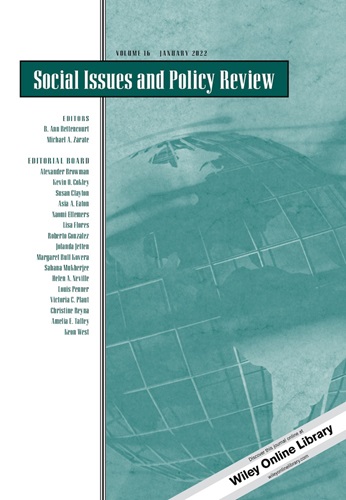理解肥胖问题:(非)健康饮食动机账户的政策含义
IF 5.6
1区 心理学
Q1 PSYCHOLOGY, SOCIAL
引用次数: 8
摘要
肥胖是一个严重的公共健康问题。肥胖的一个主要原因是人们所吃食物的质量和数量。试图理解暴饮暴食和不健康饮食行为的心理学研究通常将其归因于体内平衡失调和/或缺乏自我调节能力。我们在这里提出了一种不同的方法,认为饮食行为代表了目标追求,肥胖是依赖于以牺牲健康为代价实现方便和价格目标的食物的结果。我们提出并提出了经验证据,表明当健康(而不是便利和价格)问题占主导地位,并且有健康的选择时,人们能够做出更健康的选择。基于这些现有的证据,我们建议(1)未来的研究应该进一步探索个人的食物选择是他们试图实现的多个目标的函数,而不是缺乏意志力;(2)政策可以通过重新确定这些目标的优先级,强调健康,同时增加健康食品的可得性和可负担性来促进健康饮食。本文章由计算机程序翻译,如有差异,请以英文原文为准。
Understanding the Obesity Problem: Policy Implications of a Motivational Account of (Un)Healthy Eating
Obesity represents a serious public health issue. One major contributor to obesity is the quality and quantity of foods one consumes. Psychological research trying to understand overeating and unhealthy eating behavior has often attributed it to homeostatic malfunction and/or lack of self-regulatory ability. We propose a different approach here, suggesting that eating behavior represents goal pursuit and that obesity is the result of reliance on foods that fulfill convenience goals and price goals at the expense of health goals. We propose and present empirical evidence suggesting that people are capable of making healthier choices when health (rather than convenience and price) concerns predominate and healthy options are available. Based on this existing evidence we suggest that (1) future research should further explore individuals’ food choice as a function of the multiple goals they attempt to achieve rather than as a lack of willpower, and (2) policy may contribute to healthy eating by reprioritizing these goals and emphasizing health while increasing the availability and affordability of healthy foods.
求助全文
通过发布文献求助,成功后即可免费获取论文全文。
去求助
来源期刊

Social Issues and Policy Review
Multiple-
CiteScore
22.20
自引率
1.10%
发文量
9
期刊介绍:
The mission of Social Issues and Policy Review (SIPR) is to provide state of the art and timely theoretical and empirical reviews of topics and programs of research that are directly relevant to understanding and addressing social issues and public policy.Papers will be accessible and relevant to a broad audience and will normally be based on a program of research. Works in SIPR will represent perspectives directly relevant to the psychological study of social issues and public policy. Contributions are expected to be review papers that present a strong scholarly foundation and consider how research and theory can inform social issues and policy or articulate the implication of social issues and public policy for theory and research.
 求助内容:
求助内容: 应助结果提醒方式:
应助结果提醒方式:


